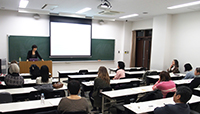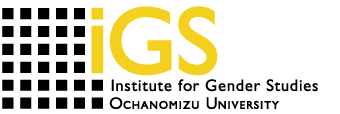Seminar “Gender, Food, and Empire: Eating the Other in Hayashi Fumiko’s Novels and Naruse Mikio’s Adaptation Films”
In her book titled Women Adrift:The Literature of Japan’s Imperial Body, Horiguchi analyzed the relationship between the body of women who migrated inside the territory of the Japanese Empire and the discourse of kokutai (the body of the empire). Following that research, her current research focuses on the food which was the source to create the bodies of these women and the empire. The pattern of the migration of women who she analyzed is; pre-war wandering journey in naichi (within Japanese isles), wartime departure to gaichi (overseas territories), and post-war return to Japan. She examines how these women’s eating habits changed and how the food affected the construction of the identity of Japanese people and the empire, by reading three works of a novelist Hayashi Fumiko; Horoki (Diary of a Vagabond, 1930), Hokugan Butai (Northern Bank Platoon, 1939), and Ukigumo (Floating Clouds, 1951).
Horoki depicts the women workers in pre-war naichi. The heroin is poor and continually changes job and place to live. She is single and has nothing to do with a happy family dinner around a chabudai (round low table commonly used as dining table in Japan since 1880s until 1960s). Chabudai may represent the ideology of family nation state of the empire and the heroin is isolated from that. She identifies herself with a lifeless fish in a fish store and an eggplant in a greengrocer. These are the food that is going to be cheaply purchased and eaten by consumers. In another part of the book, her identification subject is aborigine who has been bought by the white man’s nation. She sees herself as a periphery existence who is geographically, socially, and ethnically pushed away from the sphere of majority. However, she is not as weak as asking for protections of the powerful, and even though she talks of the pang of hunger, she expresses her spirit that she never wants to depend on a man. In a poem on Mt. Fuji that is a symbol of Japan, she disdains the mountain as an old and rotten piece of bun made of mud and declares the resistance to the country as “not bow to you.” She also expresses her desire to move away from Japan. “I want to go to a foreign country, move somewhere far away.”
Hokugan Butai is a war report. She became a member of the Pen Squadron formed by the Agency of Information of the Japanese government, and went to the battle ground in china with military troops. Being in gaichi, outside of Japan, the narrator’s identification subject has changed to soldiers of the Japanese Imperial Army. Sharing food, cigarette, and water in battlefields has made her a member of the family nation state. Discontent toward hunger and poor meals has disappeared. She expresses her desire to nursing wounded soldiers and admiration toward their spiritual pureness. Her description of soldiers as good family men and always being kind and gentle to her is contrary to the men in Horoki who are insulting and living off women. In Horoki, her position is closer to the people in the periphery, such as Chinese people in the context of the empire, but now “the body of the Chinese soldier looked like nothing but an object to me,” and they are an “enemy” ethnic group. The Chinese has become the other to her and her position has changed to the one who eats “the other.” The contribution of such a narrative, which is written by one of the most popular writer, Hayashi, to the construction of the imperial national identity must have been significant. Her patriotic feeling which she stresses as that she would never forget for the rest of her life indicates her motivation to find her place in Japan and the narrative goes on to the post-war novel, Ukigumo.
The main character of Ukigumo is Yukiko, who earns living by prostitution for American soldiers. She also is a mistress of a married Japanese man who has been meeting her secretly. In her poor life with an ill body, she recalls her happy life with her lover at wartime Vietnam. Naruse Mikio’s adaptation film (1955) of the novel projects the contrast between the present predicament and the past joyfulness with light and darkness. Now, the couple is seated at a stained chabudai in a dark room, with their heads hung low. On the other hand, in Vietnam, they were in a dining room of a large western style house and everything in the room is white. They enjoy dinner with delightful conversation and the food is served by a Vietnamese maid. Along with that, we see an open air scene that the couple is in high spirits in bright subtropical woods. At the same time, in some flashback scenes, Hayashi has made her characters talk of their doubt and introspection toward Japanese occupiers’ attitudes that exploit Vietnam’s labor, food, and natural resources egoistically and destructively.
As is read from these three writings, women’s social agenda and political position has shifted along their drift within the empire and changes in their food condition and eating environment. Food also has close connection to the empire’s political and economic ambition and its fall as well. The narratives and memories of Hayashi Fumiko and the characters of her novels contributed to the construction and the reconstruction of the identity of the empire and the Japanese nation. In this sense, Hayashi is not only the female writer who wrote about hunger and food from the women’s perspective, but also about desire for food and political aspiration that praise and criticize the history of the Japanese empire.
In the lecture, the audience learned about the method of the literature studies as well. Starting with the understanding that our world is a world of text, it is explained that literature scholars and those of cultural studies read text and context carefully. An examination of how Cartesian dualism, which employs the division of the immaterial mind and the material body as analysis axis, would be applied in this reading is presented. The origin of the concept of “eating the other” has been searched in discussions in 1990s led by Jacque Derrida and bell hook, and Horiguchi described how the concept helped her to read Hayashi’s work. Her finding has been brought out from reading hundreds of pages of the text and watching hours of motion pictures over and over. Presentation of analysis requires selecting appropriate texts and scenes from such great amount of materials and arranging them in order. That thoroughness of the work is another aspect the audience has learned.
In a lively discussion after the lecture, a number of points were reviewed. Further explanation for her analysis was asked, another interpretation form a different point of view was suggested, comparison to other texts in the same period was presented, and difference between the novel, the film adaptation, and the stage adaptation was mentioned. Taking notes on each comment and question, Horiguchi replied to each of them thoughtfully. It seems the audience shared her passion to this new project through the seminar. Wishing this seminar is contributory for Horiguchi’s research, we look forward to the publication of her new book on this project.
Kumi Yoshihara (Project Research Fellow, IGS)

Date/Time: Nov. 25, 2016 18:30-20:00
Seminar Venue: Room 125, Main Building, Ochanomizu University
Language: English only
Speakers:
Noriko Horiguchi(University of Tennessee) “Gender, Food, and Empire: Eating the Other in Hayashi Fumiko’s Novels and Naruse Mikio’s Adaptation Films”
Coordinator/Moderator: Laura Nenzi(IGS, Ochanomizu University/ University of Tennessee)
Organizer: Institute for Gender Studies, Ochanomizu University
Number of Participants: 15

